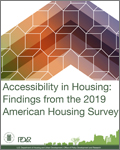The D.C. Housing Authority (DCHA) is negotiating a resolution with the federal government after being ordered this past summer to fix extensive violations of federal laws regarding the treatment of people with disabilities, including sometimes taking years to handle requests for elevator access or adequate doorway space for wheelchairs. This is after the U.S. Department of Housing and Urban Development (HUD) condemned the authority for remaining “woefully out of compliance” with federal law and, in a letter on August 23rd, specified a series of steps it must take to remedy the failures. Among the city’s largest landlords, the authority serves about 30,000 households through housing vouchers and mixed-finance and traditional public housing properties.
The letter from HUD says that in 2023 it conducted on-site surveys of 33 public housing units out of over 700 that DCHA had said conformed to Uniform Federal Accessibility Standards. None of the inspected units were fully compliant, HUD said. The violations included wheelchair ramps that exceeded maximum slopes, playgrounds that had no ramps at all, handrails that were nonexistent or at improper heights, and doorways narrow enough to make it difficult or impossible for wheelchair users or others with mobility issues to get through. In one case, a woman spent years in a public housing unit where the bathroom doorway was too narrow for her motorized wheelchair. The deficiency required the woman “to undergo a painful routine of propping herself up using upper body strength to get into and out of the bathroom multiple times each day.” In 2022, after the woman filed a complaint with HUD, the authority moved her to a unit with accessible features that had been vacant for nearly three years. In another case, a 74-year-old woman who had a full knee replacement lived in a third-floor apartment and requested to move to a building with an elevator. DCHA did not approve her request until more than two years later. The letter described maddening paperwork delays and demands for verification from doctors about disabilities that were evident, such as an 81-year-old woman’s difficulty maneuvering in her bathroom, creating a need for grab-bars at her toilet and shower. DCHA failed to maintain adequate paperwork to document compliance with federal law, the letter said, and at times did not cooperate with HUD’s investigation. In another case detailed in the letter, a woman began at-home dialysis, and DCHA approved a larger apartment for her to accommodate the necessary equipment. It then took the authority almost four months to issue the new voucher, despite repeated emails from her lawyer and a caseworker at Miriam’s Kitchen.
DCHA has a long history of failing to comply with federal laws designed to ensure that people with disabilities are not shut out of access to housing. In 2001, The Post wrote about children who lived in inaccessible D.C. public housing and were forced to drag themselves up steps. That year, HUD required the housing authority to make over 500 units accessible to people with disabilities after finding the authority never complied with federal accessibility legislation.
HUD’s letter in August specified corrective actions DCHA must take, including conducting a needs assessment of all tenants and applicants to its public housing and voucher programs. DCHA was required to revamp policies and training, retain an architect to survey properties, and install a full-time coordinator “with sufficient expertise and staff” to handle requests for reasonable accommodations from those with disabilities. HUD spokespeople did not respond to a message requesting comment about DCHA’s compliance. The federal agency’s efforts to follow up on the demands of its Office of Fair Housing and Equal Opportunity, which focuses on eliminating housing discrimination, will be more complicated with the wave of recently-announced worker firings and spending cuts.
Burdo, the DCHA spokeswoman, said the housing authority’s steps so far have included moving its ADA compliance office to under the agency’s legal office, addressing requests from residents, examining its policies and trying to improve its data integrity. DCHA also has begun trying to hire an architect to confirm compliance of units with accessibility standards, Burdo said.
Sunny Desai, managing attorney at Legal Counsel for the Elderly, has advocated for DCHA clients for several years and spoken about the agency’s problems at D.C. Council housing committee meetings. He said intransigence, lack of transparency, and stonewalling were major problems under its past leadership. “They’re far more receptive” under Pettigrew, but change is not coming fast enough, Desai said.







